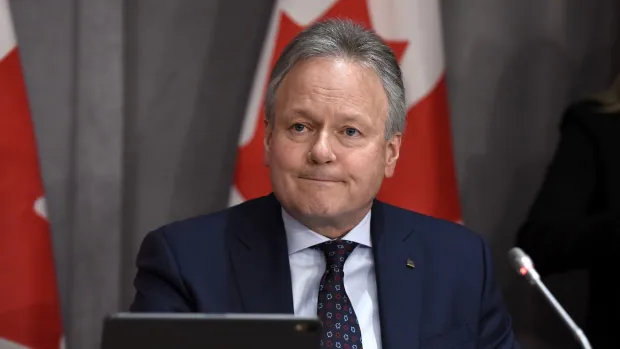[ad_1]
The Canadian economy may need to find a way to permanently adjust to higher oil and gas prices even when the cost of other goods start to fall, according to a former Bank of Canada governor.
In an interview Wednesday with CBC News Network’s Power & Politics Stephen Poloz, who was the Bank of Canada governor from 2013 to 2020, said Canada’s inflation rate may get back down to the official two per cent target in a year or two, but he struck a less optimistic note when it came to the higher cost of fuel.
“We might have to pay more for oil and gas forever,” Poloz told host Vassy Kapelos. “And if that’s the case, that’s not inflation. It’s a higher price that we’ll have to pay and we’ll adjust to that higher price somehow in our economy.”
Earlier in the day Statistics Canada reported that Canada’s inflation rate hit a nearly 40 year high of 7.7 per cent.
While the average cost of food items went up 9.7 per cent over the past year, it’s the higher cost of gas — up 48 per cent compared to a year ago — that’s the single biggest factor affecting the inflation rate.
WATCH | Call to fire Bank of Canada governor is ‘pure politics’: Stephen Poloz
Former Bank of Canada Governor Stephen Poloz joined Power & Politics Wednesday to discuss soaring cost of living and Conservative leadership candidate Pierre Poilievre’s call to fire current Bank Governor Tiff Macklem.
Poloz said the key question Canada’s central bankers will examine in trying to manage inflation is how the high fuel prices end up affecting other parts of the economy.
“That is the part that is subject to control, and that is the part the central banks will be responding to, not the energy costs themselves,” he said.
The bank has raised interest rates a number of times this year, citing inflation. The benchmark interest rate is currently 1.5 per cent.
The United States Federal Reserve recently hiked its benchmark interest rate 75 bases points to 1.75 per cent, its single biggest hike in decades.
Poloz said he expects the inflation rate to start ticking down in the latter half of the year, in part because of the Bank of Canada’s tightening.
“I think people will be reassured by it,” he said.
Poloz defends central bank against criticism
Some politicians and economists have criticized the Bank of Canada for waiting too long to raise interest rates as demand for goods and services recovered from COVID-19-related shutdowns.
But Poloz defended the bank’s monetary policy, saying it was difficult to predict the effects of the Delta and Omicron variant waves on the economy.
“We were pretty resilient to those. So of course if you had known how things would turn out, I think you might have done it differently,” Poloz said.
“But of course the fact is we didn’t know how it would turn out. And so it was right to be cautious throughout this.”
Poloz said the cautious approach to raising interest rates was necessary to guard against what he says was a greater threat than inflation — deflation, or a drop in prices. He said a failure to protect against deflation would have “run the risk of creating the second Great Depression.”
“We should all be pretty happy that that was averted.” Poloz added.
Conservative leadership candidate Pierre Poilievre has been particularly critical of the Bank of Canada’s monetary policy, accusing it of “printing money” and fuelling rising prices. Poilievre has said that, if he becomes prime minister, he’ll fire the current Bank of Canada Governor, Tiff Macklem.
Poloz called the proposal “pure politics” and “unfortunate.”
He also didn’t welcome criticism of the institution he once led.
“It’s unfortunate that politics infects the monetary policy process at all. Central banks are designed to be separate from politics and for very good reasons,” Poloz said.
He said that traditionally, central banks are independent because of the threat of political pressure to loosen interest rates, and potentially cause inflation as a result — but now political pressures are coming from the other direction.
But Poloz said there is a silver lining to criticism of the bank.
“I’m gratified that right now, the public perception is that inflation is is a bad thing and we should fight it,” he said.
[ad_2]
Source link









